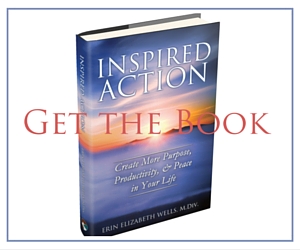I had a call recently with a passionate young woman entrepreneur/activist who was looking for help with some of her productivity challenges. I’ll call her Claire for the sake of this story… Claire reminded me so much of myself about 10 years ago: driven, committed, passionate, and running on adrenalin and fumes.
Claire is full of ideas and ambition. She wants to make a difference and create real change in the world around the topics of food and sustainability. She’s ready to commit her life full time to what she loves and leave her corporate day-job behind… but she’s struggling with a sustainability issue of her own.
The crux of the issue focuses on her beliefs and work ethic… She’s learned to live in two modes: full speed or exhaustion.
In 2005, that was me too.
My Story
In 2005, I had just finished my graduate school program in June, and I was stepping into my two-year-old professional organizing business full-time. Things were going well. I had a healthy base of clients, and that fall I came up with an idea. It was a new service that I was enthralled with, and I willfully believed there would be a market for it. So, it was September, and I set myself a due date to launch this new service into the world by January 2006.
After 21 years of school, I knew how due dates worked. After all, how many rounds of finals had I experienced by that time. So, I went into finals mode… full focus, head down, work from the moment I woke up each day until generally midnight or later each night. I was excited; I was passionate about this idea. This was fun, right?
What I failed to recognize was that, that approach to life and work was adequately functional for 2-3 weeks, but completely unsustainable for 4 months. Fast-forward to Thanksgiving that year… when I was suppose to be spending time with my sweetheart (at the time) and his family, and where was I? A crying wreck, curled in a fetal position on the floor, completely exhausted, and overwhelmed by the idea of even trying to be social and spend time with a lot of people I marginally knew.
I literally ran away (drove away actually) from Thanksgiving morning that year, and I spent the day and night in a hotel… crying, sleeping, and trying to figure out what was happening to me.
It was in the week that followed that I realized… I had done this to myself! It was my own self-imposed deadline that had driven me to work so insanely hard and cost me both my equilibrium and quality time with people I cared about (both on Thanksgiving and during the three months previously when I was working rather than spending time with friends.)
This was a self-created crisis… the good news? That meant I was also completely capable of fixing it.
The Lesson
I see similar patterns happen with SO many entrepreneurs and others who have a passion for their work. The enthusiasm, eagerness, and drive to create amazing things and change people’s lives is completely genuine and, I would argue, addictive.
We want to do it ALL right now, and we create these plans, schedules, and deadlines that push us to engage dramatically and deeply. … I’m sure you are thinking, but Erin… you’re an organizing and productivity consultant. Aren’t plans, schedules, and deadlines a good thing?
Here’s my answer, which came from the bowels of my own mental breakdown that year: It’s about priorities, not due dates.
Yes, I’m a huge fan of plans. In fact, if you were to ask me what would be my favorite thing to do with an unstructured day, then I would in complete honestly tell you it’s planning. However, I’ve also learned a different approach to planning that in the ten years since my breakdown has helped me have a more effective approach to managing both my priorities and my energy:
Create the shape, and hold it loosely.
A Better Approach to Planning
So many things in our lives are self-driven… some things are not, but MANY things are. We set the goal, and we determine our pace in walking towards it. That pace can be punishing, progressive, or lethargic.
Sometime a deadline is useful because it focuses our attention. Similarly, sometime a deadline is a way to push ourselves insanely hard toward failing to achieve the impossible. It’s not that the goal isn’t achievable, it’s that the timeline isn’t realistic. This is the same reason why I tell people to pitch their SMART goals.
Therefore, if I’m telling you to pitch out 90% of your due dates and deadlines… then what do I recommend instead?
- Know your priorities (your big rocks, as the late great Stephen Covey would say)… Know clearly the most important projects on your plate
- Create plans outlining the steps to get them done.
- Manage your tasks by horizon of focus.
Know Your Priorities
What are the most important 4-8 projects currently on your plate? Those are your Big Rocks, your top priority projects. If you start your list and come up with more than 8, then you are no longer listing priorities but rather various things on your plate. I’ve got a great story about this challenge and realization with one of my executive clients… but I’ll save that for another day.
Create Your Plan to Achieve Your Goal
You want to publish a book? Ok, here are some steps that might be on your plan:
- Clarify the topic, audience, and your goals for the book
- Brainstorm/outline core content
- Research self-publishing vs. traditional publishing
- Choose focus writing times in your daily/weekly rhythm
- Finish 1st draft
- Review 1st draft, edit, and rewrite needed sections
- Hire a professional editor
- Get book cover designed
- Create final draft
- Layout book… etc.
These are just a few steps that might be on your book publishing journey… or if you’re going the traditional publishing route then there might be items about creating a book proposal and finding an agent.
What you need to know are the essential milestones and the order they go in. In other words, you can’t layout your book until you have a final draft, and you can’t have a final draft until you’ve written a first one. Create your plan for the order of completion of your milestones… what matters significantly less is the specific date by which each of them will be achieved.
Manage Your Tasks by Horizon of Focus
How do you make sure that you continue to make progress? Identify one task (5-90 minutes) related to the book that you can do today that moves you toward one of your milestone projects. If you’ve got time in your day, then do a second one too! If not, then you know that you’ve continued your commitment and are appropriately moving forward.
Drawing your tasks from your plan, they will fall into four horizon categories: Today, Soon, Later, or Someday Maybe.
- Keep your Today list limited to 4 items (See my previous post about Choosing your One Thing/Inspired Action for each day for more about that.)
- The items that are important to focus on as soon as you have time and energy belong into the Soon category.
- The other stuff that you are committed to achieving, but isn’t relevant yet belongs in Later.
- And those good ideas that you want to capture, but you aren’t sure that you’re committed to accomplish fall into Someday Maybe.
Make progress at whatever rate feels functional and authentic given the shape of your life and other commitments, but don’t allow yourself to sacrifice all other priorities in a self-destructive drive to accomplish this one.
If you keep moving forward, taking consistent steps toward your outcome each day, then you WILL achieve it. It’s a certainty… and you’ll get there as quickly as you choose to get there while not aiming to careen through the finish line, exhausted, frustrated, and unable to move for weeks.
The Bottom Line
Stop using due dates to prioritize! Unless is has an actual due date (like writing your blog post for your editorial calendar), creating an arbitrary one isn’t helpful and can create unnecessary stress.
It can also create extra work for those of you still using your calendar to manage your task list. How often have you found yourself moving that task from one date to the next when it doesn’t get “done” according to your arbitrary schedule. (Stop that btw… your calendar is NOT the appropriate place for non-time-based tasks. Check out the Start Your Master List eGuide, if you haven’t already, to learn a better system.)
Having now shared one of my darkest times… allow me to ask you: have you ever had this experience too? What have you learned about effectively managing your priorities, due dates, and expectations?
I’d love to learn more and share insights around this challenging issue. Please share your thoughts and questions in the comments below, and thanks in advance for your honesty and candor around your own experiences!



